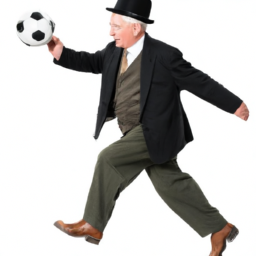

The question of who invented soccer is a subject of ongoing debate among sports historians. While the origins of soccer can be traced back to ancient civilizations, it's challenging to pinpoint a single inventor. Some credit the ancient Chinese, Greeks, and Romans for playing early ball games that resemble soccer. However, modern soccer as we know it today began to take shape in England during the 19th century, with various schools and clubs contributing to its development.
In the 19th century, soccer evolved as a standardized sport with agreed-upon rules, marking a significant turning point in its history. The Football Association (FA) in England played a pivotal role in codifying the game's rules in the 1860s. The widespread adoption of these rules led to the birth of association football, laying the foundation for the global sport we cherish today.
While the precise inventor of soccer remains a mystery, the sport's journey from ancient ball games to its modern form is a testament to its enduring appeal and cultural significance. The evolution of soccer rules and the contributions of various individuals and organizations have shaped it into the beloved sport it is today.
The birth of association football, commonly known as soccer, can be traced back to 19th-century England. Before the standardization of rules, various forms of football were played, often with differing regulations.
The FA's formation led to the development of the Laws of the Game, which included fundamental rules like no using hands except for the goalkeeper, and the prohibition of carrying or throwing the ball. These rules laid the groundwork for the modern sport we know today. The term "association football" was coined to distinguish it from other codes of football played during that time.
From England, association football rapidly spread to other countries, gaining popularity worldwide. The FA's role in shaping the game and its commitment to fair play and sportsmanship remain integral to soccer's global appeal. The birth of association football marked the beginning of a sport that would capture the hearts of millions and become a global phenomenon.
Soccer, known as football outside of North America, is more than just a game; it's a global phenomenon that unites people across continents, cultures, and languages. Originating in various forms thousands of years ago, with historical traces in ancient China, Greece, and parts of Central America, the game as we know it today began to take shape in 19th-century England. It was here that the first formal rules were established, giving birth to the sport that millions adore today.
Central to soccer's appeal is its simplicity and accessibility. All you need is a ball and an open space, and a game can spring to life. This simplicity has allowed soccer to spread globally, becoming the most popular sport in the world. It's played in the backstreets of Rio de Janeiro, the schoolyards of Tokyo, the parks of Paris, and the beaches of Africa. Its reach is unparalleled, cutting across social, economic, and racial divides.
The sport's governing body, FIFA, oversees soccer at an international level, including the prestigious FIFA World Cup, held every four years. The World Cup is a spectacle like no other, capturing the hearts of billions around the globe. It's not just about winning or losing; it's about national pride, unity, and the beautiful display of soccer's unifying power.
Club soccer also holds a significant place in the hearts of fans, with leagues like the English Premier League, Spain's La Liga, and Italy's Serie A drawing global audiences. Clubs like Manchester United, Barcelona, and Real Madrid have become household names, with fanbases stretching far beyond their local regions. Players like Lionel Messi, Cristiano Ronaldo, and Marta have transcended the sport, becoming cultural icons and inspirations for aspiring young players worldwide.
Soccer is more than a sport; it's a language spoken by billions. Its beauty lies in its ability to bring people together, creating moments of joy, sadness, triumph, and despair. Whether it's a child kicking a ball in a remote village or a packed stadium roaring with fans, soccer's heartbeat is felt across the globe, making it a true embodiment of a global passion.
In the early days of football's evolution, various regions and schools had their own codes and rules for the game. These early football codes laid the foundation for what would eventually become association football, or soccer. Different forms of football were played with variations in rules, such as the use of hands, the size of teams, and field dimensions.
One of the most influential early codes was the Cambridge Rules, established in 1848. These rules, developed by students at Cambridge University, emphasized kicking the ball rather than handling it, setting a precedent for the sport's future. Other schools and clubs had their own interpretations of the game, leading to a diversity of playing styles.
As the 19th century progressed, efforts were made to standardize the rules, leading to the formation of the Football Association (FA) in 1863. Jules Rimet Trophy The FA's goal was to create a unified set of regulations, ultimately giving rise to association football, the modern version of the sport we cherish today. The early football codes serve as a fascinating historical backdrop to soccer's development and evolution.

The question of who should be credited as the inventor of soccer has sparked passionate debates among sports historians for years. While there is no single inventor, soccer's evolution can be traced through a series of key milestones. Early civilizations, including the Chinese, Greeks, and Romans, played various ball games that involved kicking a ball. However, modern soccer began to take shape in 19th-century England with the establishment of standardized rules.
The Football Association (FA) played a pivotal role in shaping soccer's history by codifying the Laws of the Game in 1863. This marked the transition from a multitude of football codes to a unified sport known as association football. The FA's efforts to standardize the rules led to the rapid spread of soccer across the globe.
While there may not be a single inventor of soccer, it's the collective contributions of ancient civilizations, schools, clubs, and organizations like the FA that have shaped the beautiful game we know today. The ongoing debate about its inventor is a testament to soccer's rich and diverse history.
The evolution of soccer rules is a fascinating journey that spans centuries. Cuju Soccer's origins can be traced back to ancient civilizations, where ball games involving kicking were prevalent. However, it was in 19th-century England that soccer began to take shape with the standardization of rules.
One of the key milestones in the evolution of soccer rules was the formation of the Football Association (FA) in 1863. The FA established the Laws of the Game, which included fundamental rules such as the prohibition of using hands (except for the goalkeeper) and the offside rule. These rules laid the foundation for modern association football.
Over the years, the Laws of the Game have undergone refinements and updates to adapt to the changing nature of the sport. International governing bodies like FIFA have played a crucial role in ensuring consistency and fairness in soccer rules, making it a global sport enjoyed by millions worldwide.


FIFA, the Fédération Internationale de Football Association, has played a pivotal role in shaping the history of soccer. Founded in 1904, FIFA was established to oversee and promote international soccer competitions and ensure consistency in the sport's rules and regulations.
One of FIFA's most significant contributions to soccer history was organizing the first-ever FIFA World Cup in 1930. This historic event brought nations together in the spirit of competition and marked a major milestone in the sport's global development. CAF Since then, the World Cup has become one of the most-watched sporting events globally.
FIFA continues to be the governing body for international soccer, overseeing various tournaments, including the FIFA World Cup, FIFA Women's World Cup, and numerous youth and regional competitions. Its commitment to promoting the sport and fostering unity among nations through soccer has solidified its place in soccer history.
Before the emergence of modern soccer, ancient civilizations around the world engaged in various ball games that bear similarities to the sport we know today. In ancient China, a game called "cuju" involved kicking a ball into a net, dating back to the 2nd century BC. Similarly, the Greeks played "episkyros," a game where two teams tried to get a ball past the opponent's goal line.
In Rome, a game known as "harpastum" featured teams trying to control a small ball and score by getting it past the opposing team's goal. These early ball games laid the groundwork for the development of soccer and provided a glimpse into the enduring human fascination with kicking a ball to achieve a common goal.
While these ancient ball games may not have adhered to modern soccer's rules, they showcase humanity's longstanding love for the sport. Bobby Moore They serve as historical evidence of the game's evolution over centuries, from diverse cultures and regions.

Answer: The term 'football' historically referred to games played on foot, as opposed to on horseback. Since soccer involves players using their feet to control the ball, it was naturally called 'football'. The name 'soccer' originated as a slang abbreviation of 'association football' in England but became more commonly used in countries where 'football' referred to different sports, like American football in the United States.
Answer: Modern soccer originated in England in the mid-19th century. Schools and clubs played their own versions of football with varied rules. In 1863, representatives from different clubs met in London and formed the Football Association, unifying the rules of the game and laying the foundation for modern soccer.